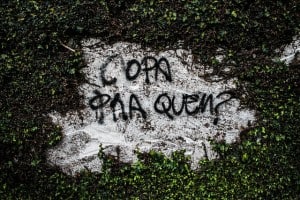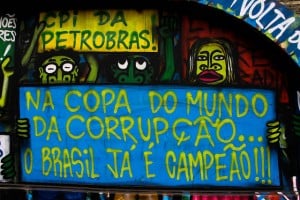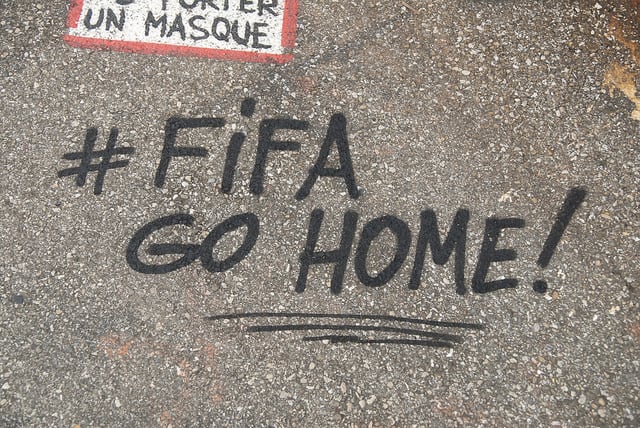I love the World Cup. I love the Olympics. I especially love what they represent: Team meeting team, each under its own flag and anthem, competing and celebrating athleticism on an even playing field, an honor passed nation to nation. The exhilaration! The vigor! The passion! Being a USA fan, even the heartbreak. I love the tradition, the airport commercial and “Mas que nada” from my childhood World Cup viewings, the highlight reels of Maradonas and Peles, a slow-surging success of US women’s and men’s national teams. It gets my blood pumping, straight into the semifinals.
And even this kitschy cartoon sequence takes me back to the beauty and diversity of Brazil from my time with World Youth Day and MAGIS:
But outside the pulsing stadiums, there are protests, and protests beyond soccer, no matter how badly Brazil lost in the semifinal.*

Movimento Passe Livre
MPL 19/06 São Paulo
(CC SA_BY) by Flickr user Ninja Midia | Flickr Creative Commons
Eyes pried from the ball between manicured fields and manicured stars, I’m snatched from my World Cup trance and reminded of the ugly behind the scenes, whether for this World Cup (#NaoVaiTerCopa), for the last World Cup (“They lied to us and betrayed us”), or even already for the next World Cup (“But they are ignoring the hardships, blood and sweat of thousands of migrant workers…”).
Protest is a form of public dissonance, provoking collective conscience around hidden social problems, whether by deliberate exclusion or by sensitized ignorance. Protest can remind us that the “shadow side” of the World Cup is, more than anything, about people, people getting hurt, swindled, or oppressed, whether Brazilian, South African, or Nepali.
***
In June, WIRED published an interview with 12PM Photographic, a collective of five photographers brought together by their aesthetic intent, one that fearlessly probes the “visceral experience” of events as much as their “political implications.” The results are variously “chaotic,” “gritty,” “pulse-pounding,” and “frenetic” – witness their June 19th video:
19 de Junho de 2014 from 12PM Photographic on Vimeo.
This is a very different cinematic view of the World Cup – an uncomfortable invitation to go beyond entertainment of the Cup and to consider the claims and concerns of the protesters – the Cup’s socio-political shadow side.
Whereas “the police, government, and financial interests tied up in the games certainly would like to downplay the realities of what’s happening in the streets and the sentiments against them,” continues WIRED, they conclude that “it’s up to people in the streets—be they journalists or documentarians, artists or activists, something in between—to share their vision of the reality beneath the gold and green flags.”
***
We’ve seen various representations of the World Cup, but have we seen its full reality?

Movimento Passe Livre
MPL 19/06 São Paulo
(CC SA_BY) by Flickr User Ninja Midia | Flickr Creative Commons
Protesters claim that a significant portion of the World Cup’s reality is being suppressed and ignored. Against perceived injustice, against ignorance, against blindness, however, reality always seems to find its voices and spokespeople. These voices may be violent, may be jarring, and may be disturbing, but their aim is always to wake us up, to shake us from sleep, to broaden our gaze, and to notice the trampling of the least: Voices and spokespeople in every age emerge to tell hidden stories – but we don’t always hear them – or we don’t always listen to them.
What does it mean for us to hear them in this World Cup, balancing electric joy with obscured sufferings, athletic purity with corruption, national anthems with derogatory chants, the game with the politic?
Is it as important for us to challenge the World Cup as it is for us to celebrate it? Is there something lost when we don’t hear the whole story?
******
*Correction: This post originally stated that Brazil lost to Germany in the quarterfinal. It has been corrected to show it lost in the semifinal round. We apologize for the error.
Cover Image: FiFA go Home! DDC_0550 by Flickr User thierry ehrmann | Flickr Creative Commons, available here.


